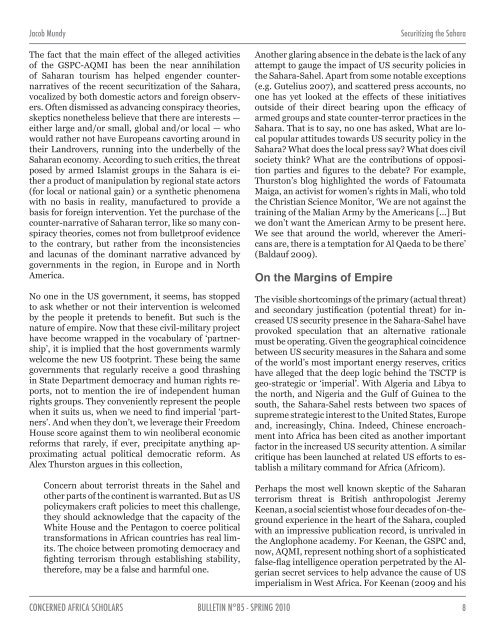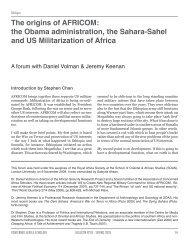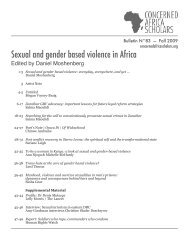Western Sahara and the United States' geographical imaginings
Western Sahara and the United States' geographical imaginings
Western Sahara and the United States' geographical imaginings
Create successful ePaper yourself
Turn your PDF publications into a flip-book with our unique Google optimized e-Paper software.
Jacob Mundy Securitizing <strong>the</strong> <strong>Sahara</strong><br />
The fact that <strong>the</strong> main effect of <strong>the</strong> alleged activities<br />
of <strong>the</strong> GSPC-AQMI has been <strong>the</strong> near annihilation<br />
of <strong>Sahara</strong>n tourism has helped engender counternarratives<br />
of <strong>the</strong> recent securitization of <strong>the</strong> <strong>Sahara</strong>,<br />
vocalized by both domestic actors <strong>and</strong> foreign observers.<br />
Often dismissed as advancing conspiracy <strong>the</strong>ories,<br />
skeptics none<strong>the</strong>less believe that <strong>the</strong>re are interests —<br />
ei<strong>the</strong>r large <strong>and</strong>/or small, global <strong>and</strong>/or local — who<br />
would ra<strong>the</strong>r not have Europeans cavorting around in<br />
<strong>the</strong>ir L<strong>and</strong>rovers, running into <strong>the</strong> underbelly of <strong>the</strong><br />
<strong>Sahara</strong>n economy. According to such critics, <strong>the</strong> threat<br />
posed by armed Islamist groups in <strong>the</strong> <strong>Sahara</strong> is ei<strong>the</strong>r<br />
a product of manipulation by regional state actors<br />
(for local or national gain) or a syn<strong>the</strong>tic phenomena<br />
with no basis in reality, manufactured to provide a<br />
basis for foreign intervention. Yet <strong>the</strong> purchase of <strong>the</strong><br />
counter-narrative of <strong>Sahara</strong>n terror, like so many conspiracy<br />
<strong>the</strong>ories, comes not from bulletproof evidence<br />
to <strong>the</strong> contrary, but ra<strong>the</strong>r from <strong>the</strong> inconsistencies<br />
<strong>and</strong> lacunas of <strong>the</strong> dominant narrative advanced by<br />
governments in <strong>the</strong> region, in Europe <strong>and</strong> in North<br />
America.<br />
No one in <strong>the</strong> US government, it seems, has stopped<br />
to ask whe<strong>the</strong>r or not <strong>the</strong>ir intervention is welcomed<br />
by <strong>the</strong> people it pretends to benefit. But such is <strong>the</strong><br />
nature of empire. Now that <strong>the</strong>se civil-military project<br />
have become wrapped in <strong>the</strong> vocabulary of ‘partnership’,<br />
it is implied that <strong>the</strong> host governments warmly<br />
welcome <strong>the</strong> new US footprint. These being <strong>the</strong> same<br />
governments that regularly receive a good thrashing<br />
in State Department democracy <strong>and</strong> human rights reports,<br />
not to mention <strong>the</strong> ire of independent human<br />
rights groups. They conveniently represent <strong>the</strong> people<br />
when it suits us, when we need to find imperial ‘partners’.<br />
And when <strong>the</strong>y don’t, we leverage <strong>the</strong>ir Freedom<br />
House score against <strong>the</strong>m to win neoliberal economic<br />
reforms that rarely, if ever, precipitate anything approximating<br />
actual political democratic reform. As<br />
Alex Thurston argues in this collection,<br />
Concern about terrorist threats in <strong>the</strong> Sahel <strong>and</strong><br />
o<strong>the</strong>r parts of <strong>the</strong> continent is warranted. But as US<br />
policymakers craft policies to meet this challenge,<br />
<strong>the</strong>y should acknowledge that <strong>the</strong> capacity of <strong>the</strong><br />
White House <strong>and</strong> <strong>the</strong> Pentagon to coerce political<br />
transformations in African countries has real limits.<br />
The choice between promoting democracy <strong>and</strong><br />
fighting terrorism through establishing stability,<br />
<strong>the</strong>refore, may be a false <strong>and</strong> harmful one.<br />
Ano<strong>the</strong>r glaring absence in <strong>the</strong> debate is <strong>the</strong> lack of any<br />
attempt to gauge <strong>the</strong> impact of US security policies in<br />
<strong>the</strong> <strong>Sahara</strong>-Sahel. Apart from some notable exceptions<br />
(e.g. Gutelius 2007), <strong>and</strong> scattered press accounts, no<br />
one has yet looked at <strong>the</strong> effects of <strong>the</strong>se initiatives<br />
outside of <strong>the</strong>ir direct bearing upon <strong>the</strong> efficacy of<br />
armed groups <strong>and</strong> state counter-terror practices in <strong>the</strong><br />
<strong>Sahara</strong>. That is to say, no one has asked, What are local<br />
popular attitudes towards US security policy in <strong>the</strong><br />
<strong>Sahara</strong>? What does <strong>the</strong> local press say? What does civil<br />
society think? What are <strong>the</strong> contributions of opposition<br />
parties <strong>and</strong> figures to <strong>the</strong> debate? For example,<br />
Thurston’s blog highlighted <strong>the</strong> words of Fatoumata<br />
Maiga, an activist for women’s rights in Mali, who told<br />
<strong>the</strong> Christian Science Monitor, ‘We are not against <strong>the</strong><br />
training of <strong>the</strong> Malian Army by <strong>the</strong> Americans [...] But<br />
we don’t want <strong>the</strong> American Army to be present here.<br />
We see that around <strong>the</strong> world, wherever <strong>the</strong> Americans<br />
are, <strong>the</strong>re is a temptation for Al Qaeda to be <strong>the</strong>re’<br />
(Baldauf 2009).<br />
On <strong>the</strong> Margins of Empire<br />
The visible shortcomings of <strong>the</strong> primary (actual threat)<br />
<strong>and</strong> secondary justification (potential threat) for increased<br />
US security presence in <strong>the</strong> <strong>Sahara</strong>-Sahel have<br />
provoked speculation that an alternative rationale<br />
must be operating. Given <strong>the</strong> <strong>geographical</strong> coincidence<br />
between US security measures in <strong>the</strong> <strong>Sahara</strong> <strong>and</strong> some<br />
of <strong>the</strong> world’s most important energy reserves, critics<br />
have alleged that <strong>the</strong> deep logic behind <strong>the</strong> TSCTP is<br />
geo-strategic or ‘imperial’. With Algeria <strong>and</strong> Libya to<br />
<strong>the</strong> north, <strong>and</strong> Nigeria <strong>and</strong> <strong>the</strong> Gulf of Guinea to <strong>the</strong><br />
south, <strong>the</strong> <strong>Sahara</strong>-Sahel rests between two spaces of<br />
supreme strategic interest to <strong>the</strong> <strong>United</strong> States, Europe<br />
<strong>and</strong>, increasingly, China. Indeed, Chinese encroachment<br />
into Africa has been cited as ano<strong>the</strong>r important<br />
factor in <strong>the</strong> increased US security attention. A similar<br />
critique has been launched at related US efforts to establish<br />
a military comm<strong>and</strong> for Africa (Africom).<br />
Perhaps <strong>the</strong> most well known skeptic of <strong>the</strong> <strong>Sahara</strong>n<br />
terrorism threat is British anthropologist Jeremy<br />
Keenan, a social scientist whose four decades of on-<strong>the</strong>ground<br />
experience in <strong>the</strong> heart of <strong>the</strong> <strong>Sahara</strong>, coupled<br />
with an impressive publication record, is unrivaled in<br />
<strong>the</strong> Anglophone academy. For Keenan, <strong>the</strong> GSPC <strong>and</strong>,<br />
now, AQMI, represent nothing short of a sophisticated<br />
false-flag intelligence operation perpetrated by <strong>the</strong> Algerian<br />
secret services to help advance <strong>the</strong> cause of US<br />
imperialism in West Africa. For Keenan (2009 <strong>and</strong> his<br />
CONCERNED AFRICA SCHOLARS BULLETIN N°85 - SPRING 2010 8




